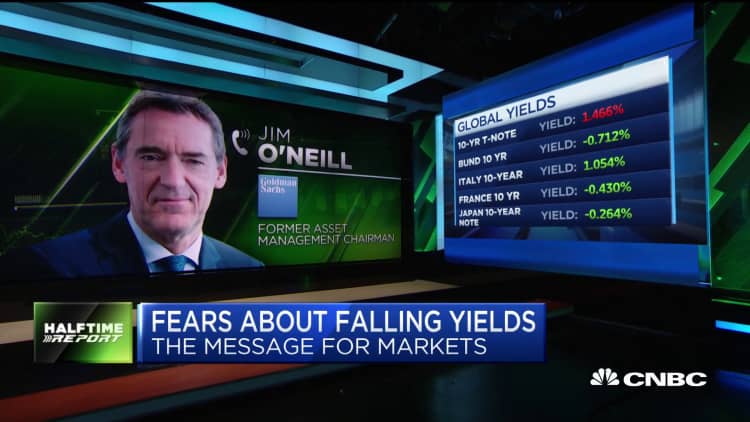
The U.S. economy is becoming "riskily dependent" on the "overleveraged consumer," economist Jim O'Neill warned Wednesday on CNBC, causing him to flash back to the last recession.
"It's like, on some ways, like in 2008," said the former chairman of Goldman Sachs Asset Management and current chair of Chatham House, an international affairs think tank.
In the second quarter, U.S. consumer debt rose 1.4%, or $192 billion, to nearly $13.9 trillion. That's higher than the previous peak of about $12.7 trillion before the 2008 financial crisis, according to the New York Fed.
However, when compared with household worth, the debt is about half of what it was just before the current expansion began — 14.4% now compared with 27.4% in June 2009.
In a "Fast Money Halftime Report" interview, O'Neill said that economic strength depends on consumption, "which is fine unless financial conditions tighten unexpectedly" and indebted consumers "can't keep up the consumption."
That's exactly what happened in the run-up to the financial crisis that led to the Great Recession, the worst economic calamity since the Great Depression.
Consumers spending makes up about two-thirds of U.S. economic growth.
"There's a lot to worry about," said O'Neill, who in 2001 coined the term BRICs to talk about the economies of Brazil, Russia, India and China. He added he's concerned that a U.S. recession is looming — "partially because of this very strange character that you have as your president."
Economic weakness has "no chance of improving until Trump gets over his very erratic love affair with trade tariffs, which doesn't look like it's happening anytime soon," the British-born O'Neill added. "Or you guys get over your love affair with Trump."
Earlier this month, President Donald Trump announced plans for 10% tariffs on an additional $300 billion of Chinese imports not already subject to duties.
Last Friday, China retaliated, saying it would impose new tariffs on $75 billion worth of U.S. goods and resume duties on American autos. Hours later, Trump said those new 10% tariffs, set to go into effect on Sept. 1 and Dec. 15, would go to 15%, and levies already on $250 billion in Chinese goods would go to 30% from 25%, starting Oct. 1.
Then on Monday, Trump said at the G-7 summit in France that Beijing called and said it was ready to reenter negotiations and begin serious talks. China insists no phone calls took place over the weekend.
A White House spokesman did not immediately respond to CNBC's request for comment on O'Neill's comments.


